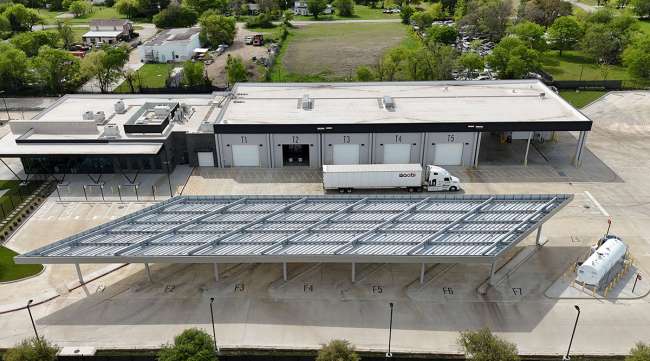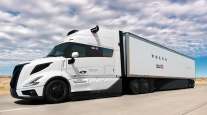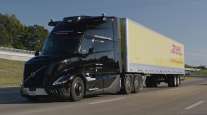Staff Reporter
Waabi Raises $200M as It Eyes Fully Driverless Trucks in '25

[Stay on top of transportation news: Get TTNews in your inbox.]
Autonomous technology developer Waabi has raised $200 million that will help carry it through the commercial launch of fully self-driving trucks in 2025, the Toronto-based company said June 18.
Waabi’s autonomous trucks operate with a driver in the cab and are undergoing pilot testing out of a Lancaster, Texas, terminal that opened in April. But going fully driverless with a product based on generative artificial intelligence has been Waabi’s goal since CEO Raquel Urtasun launched the company in 2021 with an $83.5 million Series A funding round.
“I have spent most of my professional life dedicated to inventing new AI technologies that can deliver on the enormous potential of AI in the physical world in a provably safe and scalable way,” Urtasun said in a statement announcing the funding round. “Over the past three years, alongside the incredible team at Waabi, I have had the chance to turn these breakthroughs into a revolutionary product that has far surpassed my expectations.”
Urtasun’s vision won support in this latest funding round from some of trucking’s biggest players as well as companies and individuals at the forefront of the deployment of AI and disruptive technologies.
The funding round was led by Urtasun’s former employer, Uber Technologies, and Khosla Ventures while strategic investors included chipmaker Nvidia, Volvo Group Venture Capital, Porsche Automobil Holding SE, Scania Invest and Ingka Investments.

Urtasun
Volvo Group Venture Capital first invested in Waabi in January 2023. The Volvo Group unit, founded in 1997, supports collaborations between startups and the Swedish truck maker.
Porsche Automobil Holding SE is the holding group for Volkswagen Group, the world’s second-largest auto manufacturer and the parent company of truck maker Traton. Scania Invest is a subsidiary of one of Traton’s truck brands. This latest round of funding marks the first time Traton-connected entities have invested in Waabi.
Financial investors alongside the strategic investors include HarbourVest Partners, G2 Venture Partners, BDC Capital’s Thrive Venture Fund, Export Development Canada, Radical Ventures and Incharge Capital.
“The market reacted very well to the proposition,” Urtasun told TT. “It is clear to investors that the current generations of artificial intelligence were too capital-intensive. That’s why there was such a great reaction.”
The new capital also will be used to grow Waabi’s commercial operations and expand the company’s team in both Canada and the United States, the company said.
Waabi’s Lancaster terminal is refining the required infrastructure, operating processes and customer services needed for commercial driverless operations. For example, Urtasun told TT that more terminals are on the way, but she noted finding space is a challenge due to the breadth of infrastructure already controlled by less-than-truckload and private fleets.
The company chose Texas to test self-driving trucks because there is a lot of freight, the weather is amenable to trucking and regulators are supportive, Urtasun said, adding that the state has become “ground zero” for the self-driving truck.
Today’s a big day for Waabi! We’ve closed our Series B funding round with a total of $200M (USD) – a huge step in our journey toward deployment of fully driverless, generative AI-powered trucks in 2025.
Read more here: https://t.co/1LX9Il1D7I — Waabi (@Waabi_ai) June 18, 2024
Waabi insists its self-driving truck system is different. “I have pursued a vision of a single AI system that can learn end to end to perform highly complex tasks that can be executed fully autonomously and in a provably safe manner,” Urtasun said in a blog released June 18. “AI systems operating in the physical world must be able to generalize to a broad range of situations, ensuring robust performance across both common scenarios as well as the longtail of unpredictable ones. Additionally, these systems need to be incredibly efficient and capable of running on edge devices, where computational resources are limited.”
Urtasun told TT that Waabi is using a computing platform that integrates Nvidia Drive Thor into its Waabi Driver system.
Corey Cox of the Tandet Group of companies discusses how early AI adopters are beginning to harvest the latest wave. Tune in above or by going to RoadSigns.ttnews.com.
“I’m excited to support Raquel’s vision through our investment in Waabi, which is powered by Nvidia technology,” Nvidia CEO Jensen Huang said. “I have championed Raquel’s pioneering work in AI for more than a decade. Her tenacity to solve the impossible is an inspiration.”
Nvidia has seen its market value soar of late, cresting $3.334 trillion June 18 — making it more valuable than both Microsoft and Apple.
Funding round leader Uber is the parent company of Uber Freight, which teamed up with Waabi in September to announce that Waabi Driver was being paired with Uber Freight’s logistics platform and marketplace technology to deliver a turnkey driver-as-a-service solution. Uber Freight ranks No. 13 on the Transport Topics Top 100 list of the largest logistics companies in North America.
“Raquel is a visionary in the field and, under her leadership, Waabi’s AI-first approach provides a solution that is extremely exciting in both its scalability and capital efficiency,” Uber CEO Dara Khosrowshahi said.
Uber ended its in-house work on autonomous vehicle development when selling its Advanced Technologies Group to Aurora Innovation in early 2021. Uber ATG included Otto, the self-driving truck startup it acquired in 2016. Urtasun was chief scientist at Uber ATG before launching Waabi.
Want more news? Listen to today's daily briefing below or go here for more info:





